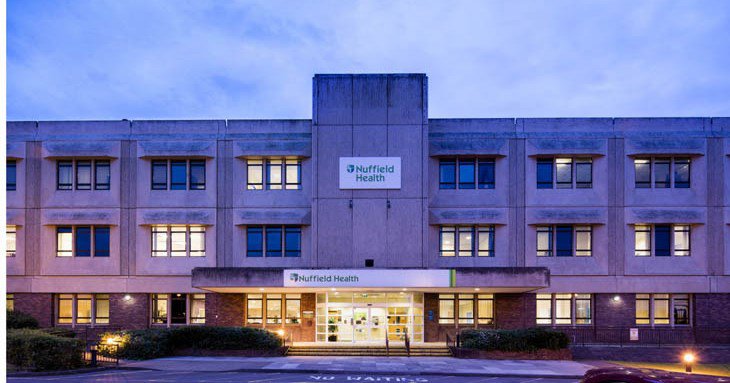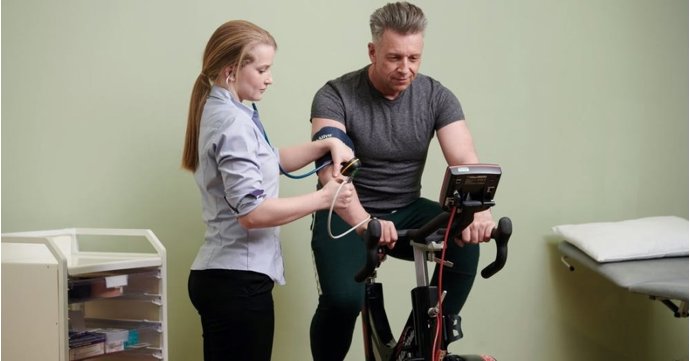What does it mean to be diagnosed with a hernia - and what can prospective patients in Gloucestershire expect if they decide to seek private treatment?
With more people opting for private healthcare post-pandemic, SoGlos spoke to the experts at Nuffield Health Cheltenham Hospital to find out how its consultants can help people suffering from this common affliction.
About the expert - Nuffield Health Cheltenham Hospital

Nuffield Health’s private hospital in Cheltenham promises first class treatment with minimum waiting lists. Offering everything from health assessments to surgery in state-of-the-art clinical facilities, as well as the latest diagnostic imaging facilities, including on-site MRI and CT scanning, areas of specialty include orthopaedics, cosmetic surgery, spinal services, sports injury, ENT, gynaecology and urology.
For more information, visit nuffieldhealth.com.
What is a hernia?
A hernia is said to have occurred when there is a new gap in the strong muscle layer of the abdominal wall. Through this gap, a hernia sac protrudes and within that sac can be fat from the abdominal cavity and sometimes even parts of the small or large bowel.
How common are hernias?
Hernias are an extremely common problem, affecting almost two per cent of the population, rising to four per cent in those over 45 years old.
Inguinal (groin) hernias are by far the most common and the lifetime risk of developing one is 27 per cent in males and 3 per cent in women.
How many different types of hernia are there?
By far and away the most common type of abdominal wall hernia is an inguinal or groin hernia. The second most common is a paraumbilical hernia, which occurs in and around a person’s belly button.
Other recognised hernias include femoral hernias, which are more common in women and occur in a very similar area to inguinal hernias; spegelian hernias, which occur just to the side of a person’s six-pack muscles; epigastric hernias in the central upper abdomen; and hernias related to sites of previous surgery, which are called incisional hernias.
Hiatus hernias are another type of hernia and occur at the site where the oesophagus passes through the diaphragm to meet the stomach.
Why is it important to seek hernia treatment promptly?
Five per cent of hernias present at emergency level, with severe pain and blockage of the bowel. If someone has a hernia that causes pain, or interferes with their lifestyle, they should consider surgery.
The risk of a hernia strangulating or obstructing a section of bowel is very rare, but at its greatest in the first three months after development of a hernia. After this, the risk drops off but never goes away entirely. If the bowel gets stuck out in a hernia, this is a surgical emergency and should be operated on immediately.

How long can you leave a hernia untreated? Is there anything you can do to manage it?
There is no specific timeframe as to how long you can leave a hernia untreated, as it depends on each individual case - including the location, dimensions, content and symptoms of the hernia.
If
the hernia doesn’t cause any pain or discomfort, or doesn’t interfere with your
lifestyle, you may not need to treat it, but the hernia should be monitored and will never go away.
It would help to avoid lifting weights and avoid getting constipated.
Hernias can be treated with simple measures, such as a truss. A truss is a specialised garment that aims to hold a hernia in whilst the patient wears it. These can by purchased from various suppliers.
Are all hernias dangerous and is surgery always necessary?
Not all hernias are serious and surgery is not always necessary. If a hernia does not go back, or is causing pain, then seeking advice from a specialist is advised, in case further treatment is required and the hernia needs to be repaired.
Are there any cases where open surgery is preferable to keyhole surgery?
In general, there is not much difference between open and laparoscopic (keyhole) techniques. Individual surgeons’ expertise is key.
However, there are certain cases where laparoscopic surgery is required, such as bilateral groin hernias; recurrent hernias after previous open repair; and some complex incisional hernias, after previous big cut operations.
There are also certain cases where open operation is preferred, such as patients who are high risk for general anaesthetic can have open operations under local anaesthetic.
Larger hernias or hernias that are stuck and cannot be pushed back in are often treated with open, rather than keyhole methods, but with modern techniques, increasingly complex problems can be managed with minimally invasive surgery.
It is not possible to perform keyhole surgery under local anaesthesia, so if the patient needs to remain awake during surgery, that will be performed using traditional open techniques.
How quick is recovery after a hernia operation?
Recovery can be very quick. They are all done as day case operations, which means the patient can go home the same day.
The patient is expected to be up and about doing day-to-day activities very quickly. However, intense physical activities are best avoided for about a month to decrease the chances of a hernia coming back.
A surgeon will normally recommend two weeks off work, depending on a patient’s job, and four to six weeks avoiding heavy lifting. Sometimes, minor discomfort is inevitable.
Are there any complications to consider?
The risk of not having a hernia repaired include increasing discomfort, unsightly appearance, incarceration (where the hernia cannot be pushed back in), obstruction (where a piece of bowel gets blocked in the hernia) and strangulation (where a piece of bowel gets strangled in the hernia and loses its blood supply). The latter two are rare consequences, but they can be life threatening.
The risks of having a hernia fixed vary depend on the location of the hernia and the technique - your surgeon will talk you through these, as appropriate.
Risks that occur commonly enough to mention include bleeding/bruising; infection; damage to surrounding structures; pain; numbness; blood clots in the legs or lungs; the risk of general anaesthesia; and in the longer term, fluid collection under the skin at the site of the hernia, called a seroma; and recurrence of the hernia itself.
How often do hernias come back?
Using modern techniques and materials, such as mesh, has meant that the rate of recurrence runs at less that 2 per cent. If a hernia returns, there are often several surgical solutions available to fix it again.
What does your all-inclusive hernia repair package include?
The package includes all hospital, surgeon and anaesthetist fees, along with a minimum of one follow-up with the consultant after surgery. There will also be advice given for after care, if required.
To view the available consultants in Cheltenham, see nuffieldhealth.com/hospitals/cheltenham.













.png?width=432&height=227&rmode=pad&bgcolor=ffffff&quality=85)




